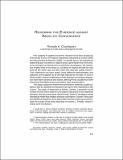Artículo
Reviewing the evidence against absolute convergence
Fecha
2002Resumen
Few subjects in applied economic research have been studied as extensively as the convergence hypothesis advanced by Solow (1956) and documented by Baumol (1986). In simple terms, the hypothesis states that poor countries or regions tend to grow faster than rich ones. In its strongest version (known as absolute convergence), the hypothesis implies that in the long run, countries or regions should not only grow at the same rate, but also reach the same per capita income. This hypothesis has been tested using different methodologies and datasets, and it appears to be strongly rejected by the data. In view of these results, several modifications of the absolute convergence hypothesis have been advanced and tested, although they usually lack both theoretical foundations and econometric rigor and discipline.
Colecciones
Descargar


